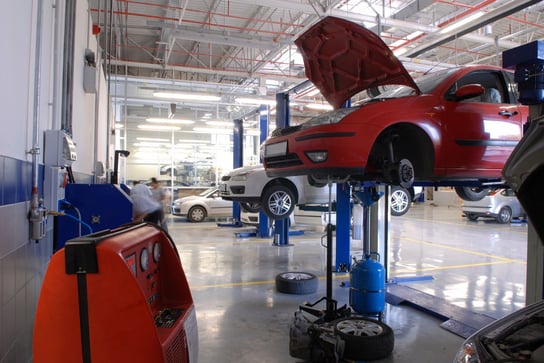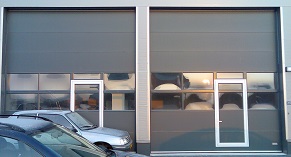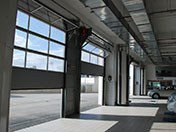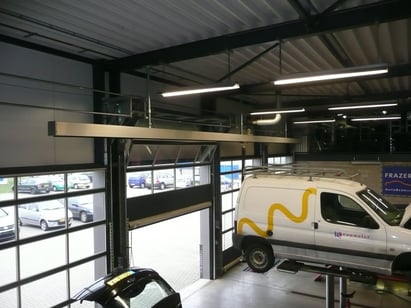Temperature management in automotive garages and workshops
How to choose a better door for your workplace
Staff in a workshop environment will tell you that temperature control in car servicing and automotive workshop areas is commonly forgotten.
Yet temperature control is not only important for staff safety and comfort (which could improve their efficiency at work and general happiness). Workshops and the automotive industry in general use hazardous substances and processes which affect air quality and can raise the indoor temperature.

For ventilation purposes, WorkSafe suggests that, “Engine bay doors should be fully open at all times. If weather conditions prevent this, the work must be evaluated and tasks such as spray painting, which could result in a buildup of fumes, should be postponed”.
Common car dealership hazards
Some of the hazards faced when working in the automotive environment include:
- Petrol containers and gas cylinders are highly flammable substances which could cause serious injury or even fatalities if not carefully handled and stored.
- Solvents can enter the body when a person breathes in their vapour, through skin contact, or through the mouth from contact with food or fingers.
- Spray paints may cause occupational asthma when fumes are inhaled. Long term exposure can affect the brain, damage the reproductive system, and cause kidney or liver damage. Contact with the skin may cause dermatitis (an inflammation of the skin).
- Batteries contain acid and must be treated with caution.
- Welding equipment generates hazardous fumes and should be separated from other workshop activities and from workers who may not be protected by fume extraction systems, ventilation or appropriate PPE.
- Dust is caused by jobs like sanding, sweeping, grinding and cutting. Small metal pieces can be generated by cutting and sanding operations.
- Carbon monoxide (CO) is a highly toxic gas produced when fuels burn incompletely. The typical internal combustion engine used in most cars and trucks can produce extremely high concentrations of carbon monoxide. We cover this in more detail below.
All of these potential hazards mean that good ventilation is absolutely essential in automotive workshops, not only for the safety and health of workers but also for their comfort.
Obviously workshop doors cannot be left open during the winter to assist with ventilation without affecting your workers' comfort. It makes your choice of workshop door critical. Here's what to look for.

Why your workshop doors are crucial for controlling temperature
Automotive workshops face a number of challenges around their engine bay doors. While steel roller shutters are common (since they are low cost and large enough to allow for vehicles to come and go), keeping such a large door open throughout the day can become uncomfortable for workers either in summer or winter.
Another factor is that steel roller shutters – even when they are kept closed – provide no insulation against outside weather conditions. Steel roller shutters are renowned for absorbing heat in the summer and transferring winter's chill inside, providing no insulation value at all.
While this may not be a problem for a home garage, for a workplace such as an automobile workshop or professional car servicing garage where staff are expected to work within the garage all day, it can become intolerable. The indoor temperature will fluctuate directly in proportion with the sun or winter chill’s effect on the external doors.
As the manager or owner of an automobile workshop or professional car servicing garage, you'll know that the effort (and cost) of trying to maintain the temperature with uninsulated steel roller doors is painful.
With a better insulated option, not only will your staff be happier and more comfortable, they'll also be more likely to work efficiently, while you save costs on heating or cooling.
An alternative to steel roller shutters for your workshop
Compact sectional doors are a great alternative to steel roller shutters or conventional sectional doors.

The compact door is a sectional door which needs no intrusive overhead support rails to be attached to the roof structure, and utilises a unique folding action to push the door leaves into a compact space above the doorway.
Compact sectional doors have been successfully implemented in various environments including car showrooms, factories and warehouses, cold storage, wash bays, processing lines, emergency department including ambulance and fire department, arenas and pavilions, loading docks, marinas, large agricultural buildings and depots.
 Compact sectional doors are made bespoke for your environment and entry, both in terms of panel requirements (whether thermal, PVC, double-glazed acrylate/polycarbonate/reinforced safety glass, mesh) as well as the opening size. They suit sizes from your average garage door opening to a large warehouse requiring access for heavy machinery and vehicles such as aeroplanes, cranes and fire engines.
Compact sectional doors are made bespoke for your environment and entry, both in terms of panel requirements (whether thermal, PVC, double-glazed acrylate/polycarbonate/reinforced safety glass, mesh) as well as the opening size. They suit sizes from your average garage door opening to a large warehouse requiring access for heavy machinery and vehicles such as aeroplanes, cranes and fire engines.
See the Melbourne Market Project where large scale thermal compact doors were installed for access to various fresh food areas by large delivery vehicles.
 A huge benefit of the Compact Sectional Door, besides its unique compact nature, is the range of glazing, ventilation, design and locking options available.
A huge benefit of the Compact Sectional Door, besides its unique compact nature, is the range of glazing, ventilation, design and locking options available.
They include:
- Full-vision glass panels constructed using aluminium box profiles with section for the filling of your choice.
- Standard colours: Anodised aluminium or a choice of 7 Standard Colours (RAL):
- With full-vision glass panels, you have the following 7 fillings to choose from:
- Double-glazed acrylate (17 mm)
- Double-glazed polycarbonate (17 mm)
- Single-glazed acrylate (4 mm)
- Single-glazed polycarbonate (4 mm)
- Single-glazed reinforced safety glass (4 mm)
- Galvanized casing with mesh measuring 50 x 50 mm (4 mm)
- Insulated sandwich insert panels (17 mm)
- Double-glazed snap-in windows (Insulation value; K = ± 2.8 W/m²K):
- Black plastic casing with double-glazed acrylate.
- Rectangular windows – 680 x 370 mm (w x h, external dimensions)
- Oval windows – 725 x 325 mm (w x h, external dimensions)
- Ventilation (Two options available):
- Ventilation panel 680 x 375 mm (w x h), Anodised aluminium, Net air opening 850 m²
- Ventilation panel 450 x 90 mm (w x h), Black plastic, Net air opening 215 m²
- Locking options consist of anti-lift protection provided as standard.
- Wicket door with options such as:
- Panic lock
- KABA lock
- Wicket door with fixed insert panel
- A pass door with galvanised steel casing directly adjacent to the compact door
- Cylinder lock fitted, with three keys
- Constructed using panels to match the compact door
- Sandwich panels above pass door installed up to the height of the Compact door as standard
- Door spring
Talk to us about selecting your ideal car workshop doors
If you would like to learn more about the various doors available for car dealerships, contact Remax Doors online or call us on 1800 010 221.





